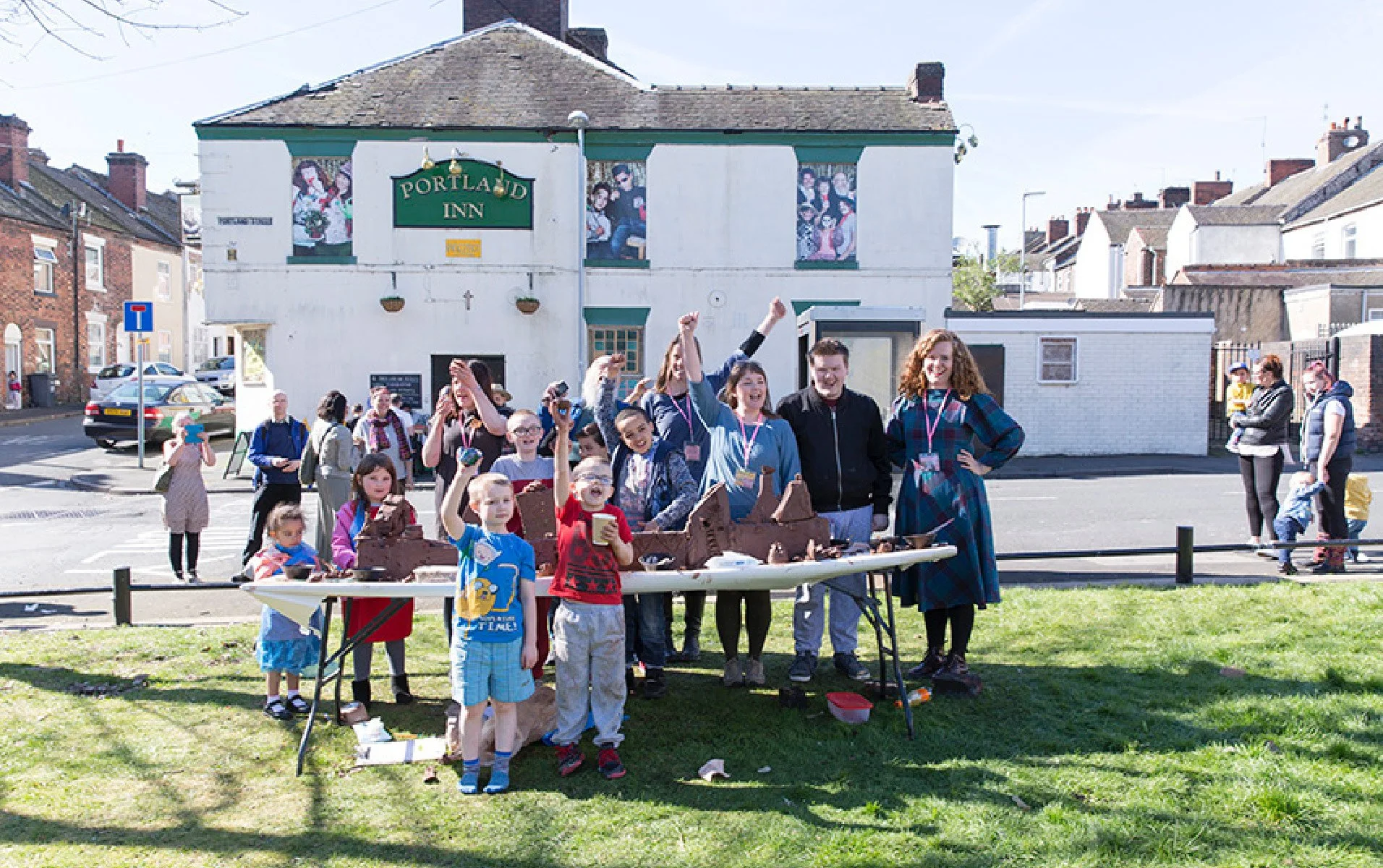Portland Inn Project CIC
CASE STUDY
COMMUNITY HEALTH IMPACT ASSESSMENT
-
The Portland Inn Project CIC is a creative arts project for a community in Stoke On Trent with an aim to achieve community cohesion, economic, social and cultural development by involving the community in development of a pioneering community space, cultural hub and social enterprise. The Portland Inn Project CIC has been cited as an exemplar project of people led change, in an underrepresented part of the city of Stoke-on-Trent.
PIPCIC works with people locally to build confidence in the neighbourhood to make positive decisions and lasting change for the community. A Community decision making panel made up of local people and services meet bi-monthly to identify issues and concerns in the area, and plan together to raise resources and make the changes needed to improve the area for everyone living and working there.
Portland Inn Project outside the local derelict pub they took over to run as a community space
CONTEXT
Over the past few years the Portland Inn Project CIC (PIPCIC) have been working in the neighbourhood to write and now deliver on a 100 year plan for the area – which will ensure the community thrives, as well as contributing to environmental goals of supporting a developing nature recovery for the neighbourhood, and increasing biodiversity through a range of environmental interventions.
In recent years they have become more interested in local and national decision making which impacts on Communities and how they can better inform national policy.
They state that their neighbourhood has suffered from negative perception and stereotyping for many years, perpetuated by being marginalised from decision making that affects the way residents live, and heightened due to a range of issues including insecure tenancies and poor quality housing. These living conditions have a significant impact on our physical and mental health.
They stated that they have consistently been met with resistance from private companies to recognise their responsibility in the health of our neighbourhood – including landlords and letting agents, property developers and the two neighbouring industrial factories.
PIPCIC have explored a variety of methods to connect with local and national bodies, and felt when joining that this programme would equip them with better knowledge and skills to be able to advocate from an evidence base for our community within these contexts. A number of times over the last few years, they said they have needed to connect to local government planning processes, and felt that the learnings from the first programme would help support them as a community to make the health case for or against decisions being made.
ACTIVITIES
As a result of the training and the toolkit provided PIPCIC implemented a process with neighbours involved in our Community Decision Making Panel, to first come together to agree how we would work together, to then define the health themes which the group wished to prioritise and to work together on defining a theory of change and then to undertake some local research, as a result of our identified priorities. PIPCIC arranged a number of workshops and walkshops to explore the themes in context.
A wide array of outcomes emerged from these working sessions. Issues such as absentee landlords, fly tipping, and air pollution were of focus. However, following a number of exercises, the group voted on which of the priorities to work on first, and noise pollution was chosen. In response to this, community members kept individual logs on noise happening in the neighbourhood, and have undertaken sound walks in the neighbourhood at different times of day to consider when noise is occurring and what the source of the noise is.
OUTPUT
The group organised to share the findings from the CHIA at an all services meeting in November 2024 with the local authorities. The purpose was to share the CHIA process undertaken and the links between environmental and social factors and determinants of health, as a way to advocate for better support for the neighbourhood.
OUTCOME
As a result of going through the CHIA course 6 members who joined PIPCIC’s workshops went on to register with local authority bodies as Community Health Champions.
They created a pamphlet which is a short one page version of the project’s summary to share with partners, and to communicate why the community deserves more support to improve health locally.
PIPCIC applied for additional funding to be able to continue the research in relation to air quality and absent landlords. We have also designed a project to directly challenge the impact of negative local media on health.
From the young people workshops, they wanted to be part of a creative project to improve some of the derelict properties, hoarding and existing graffiti in the area. A key factor in this was in response to their neighbourhood being dubbed the ‘Grot Spot’ by a local paper.
“The Portland Inn Project seeks to do what we do best - lead on a collective narrative with our neighbours as part of the improvement of our area, and in doing so, challenge a negative stereotype.”




